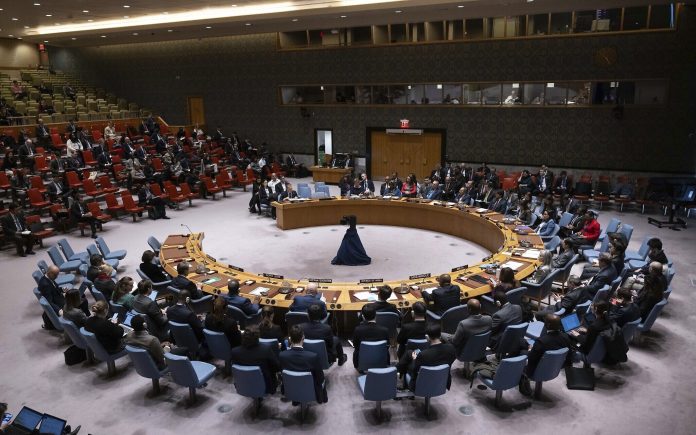The UN Security Council is expected to vote on a resolution demanding a humanitarian ceasefire in the Gaza Strip during the Muslim holy month of Ramadan, but the US has warned that the measure could interfere with talks on a cessation of hostilities between Israel and Hamas.
The resolution put forward by the council’s 10 elected members is backed by Russia and China, which on Friday vetoed a US-backed resolution that called for “an immediate and sustained ceasefire” in the Israel-Hamas war.
The 22-nation Arab Group issued a statement Friday night calling on all 15 council members to vote in favour of the resolution “to halt the bloodshed, preserve human lives and avert further human suffering and destruction,” as over 32,000 Palestinians in Gaza have died in the fighting, most of them women and children, according to Gaza’s health ministry.
The Council scheduled a vote on the resolution for Saturday morning. Many Council members hope the most powerful UN body charged with maintaining international peace and security will call for an end to the war.
The Gaza Strip is also facing an acute humanitarian situation, with an international hunger body submitting a report this week saying that “famine is imminent” in northern Gaza and that an an intensification of the war could bring half of the territory’s 2.3 million residents to the brink of starvation.
The brief resolution scheduled for a vote Saturday demands an immediate humanitarian ceasefire for Ramadan “leading to a permanent sustainable ceasefire.” It also demands “the immediate and unconditional release of all hostages” and emphasises the urgent need to protect civilians and deliver humanitarian aid throughout Gaza.
US Ambassador Linda Thomas-Greenfield told the council after Friday’s vote that the resolution’s current text “fails to support sensitive diplomacy in the region. Worse, it could actually give Hamas an excuse to walk away from the deal on the table.”
The US has vetoed three resolutions demanding a ceasefire in Gaza, the latest of which was passed with Arab support. On Friday, the US again vetoed the resolution, calling it ambiguous and saying it was not a direct demand for an end to the fighting that much of the world seeks.
The US has been criticised for not acting tough enough on its ally Israel, even as tensions between the two countries have risen.
China’s UN ambassador, Zhang Jun, said the US proposal set preconditions and fell far short of expectations of council members and the broader international community: “If the U.S. was serious about a ceasefire, it wouldn’t have vetoed time and again multiple council resolutions,” he said. “It wouldn’t have taken such a detour and played a game of words while being ambiguous and evasive on critical issues.”
The vote in the 15-member council was 11 members in favour and three against, including Algeria, the Arab representative on the council. There was one abstention, from Guyana.
The resolution reflects a change in the position of the US, which has found itself at odds with most of the world, with even Israel’s allies insisting on an unconditional cessation of hostilities.
